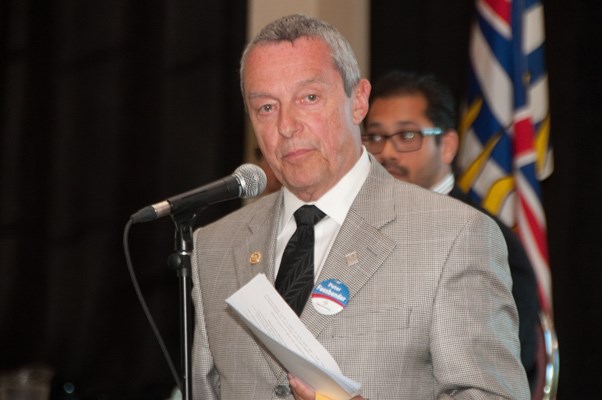 The Opposition on Wednesday quoted some tantalizing samples of the evidence the B.C. Supreme Court relied on to find that the government tried to provoke a school strike in 2012.
The Opposition on Wednesday quoted some tantalizing samples of the evidence the B.C. Supreme Court relied on to find that the government tried to provoke a school strike in 2012.
And although Premier Christy Clark and Education Minister Peter Fassbender have been publicly disputing the devastating finding, the government clammed up in the house. While the appeal is underway, they’re refusing to answer all questions.
Justice Susan Griffin released a judgment Jan. 27 on the dispute between the government and the B.C. Teachers’ Federation. She awarded the BCTF a big win, and ordered the government to pay the union $2 million.
The case revolved around a law enacted during the 2012 labour dispute, which apart from a three-day strike, mostly featured low-grade job action — no report cards and minimal volunteering.
Griffin not only struck down the law, but condemned the government’s negotiating strategy during that round of talks.
It did not negotiate in good faith, she found. It was preoccupied with pressuring the union to provoke a full strike. “Representatives thought this would give government the opportunity to gain political support for imposing legislation on the union.
“From the start ... the government had a strategy in mind that it would be to its benefit if negotiations failed.”
The government filed an appeal and Attorney General Suzanne Anton cited that a dozen times Wednesday as a reason not to answer New Democrat questions.
The questions were based on a few pages of transcript from September 2013, when then-government negotiator Paul Straszak testified.
Asked by the BCTF lawyer if the objective was to increase the pressure on teachers to have them go out on a full-scale strike, Straszak testified: “We — yes. I’ll say that’s correct.”
The Opposition quoted Straszak as testifying about the problem of a low-grade strike that was having a significant impact on education, but where parents weren’t up in arms.
Legislating an end to the dispute before it got to a full-scale strike could have caused problems. So the notion of how to get to a full strike was outlined.
Opposition Leader Adrian Dix quoted Straszak in the transcript: “You need a social licence to legislate. It could be harder to obtain if there is a targeted strike versus a full-scale strike.”
NDP MLA Rob Fleming told the house that Straszak testified: “Cabinet would be in an awkward situation in the context of a low-scale strike.”
He also quoted testimony: “We do have some tools to increase the pressure on the TF to escalate the strike.”
There was a move in 2012 to dock teachers’ pay for not volunteering, but it didn’t succeed.
Anton stonewalled for the entire half-hour question period, saying it’s before the courts and the entire record will be heard by the appeal court.
“We should leave them to it. We will not be interfering with its decision-making.”
It was a contrast from earlier remarks by Fassbender and Clark.
Fassbender wrote an e-mail directly to B.C. teachers explaining his version of events.
It said: “What is most disappointing to me is the judge’s characterization that government sought to provoke a strike. On that point we have a fundamental disagreement.”
And Clark discussing the judge’s finding with reporters on Tuesday, saying: “I fundamentally disagree with that. That’s not correct. That’s one of the many reasons that we’re going ... to have another judge get a look at it.”
She said then that cabinet confidentiality forbids her from releasing all the cabinet documents that were discussed in court and referred to by Straszak and others.
Releasing those documents was also considered in Griffin’s judgment. She said the case was unique in that the government asserted it acted in good faith, so testing that assertion made the documents highly relevant.
A full release depends on the appeal. But Wednesday’s snippets did the government’s case no good.



